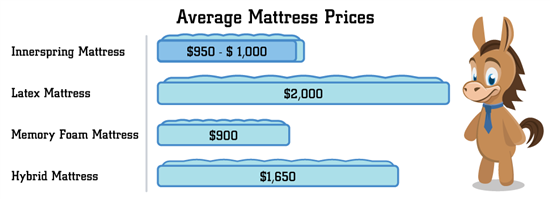How Much to Spend on a Mattress
The average mattress costs between $200 and $1,500. Some cost as much as $5,000. What is a good amount to spend? Is a more expensive mattresses worth it?
 |
It's time to buy a new bed, and you have options — too many.
You spend 1/3 of your life sleeping, so you don't want to cheap out. More expensive means better quality, right?
Not always.
High-end models can be packed with features you don't need. The truth is, most people do well somewhere in between.
We'll show you how to find that sweet spot. Learn how to get a good night's sleep without falling for pricing gimmicks.
TIP: Saatva is a popular online mattress company with products ranging from innerspring to latex beds. Visit their website to see what kind of prices to expect for your next mattress.
Know Your Sleep Position
Mattresses aren't a one-size-fits-all purchase. Each person has their own sleeping position and preferences.
Knowing your sleeping position will help you choose the right type of mattress.
- Back sleepers often prefer the balance of firmness and cushioning of innerspring and hybrid mattresses.
- Side sleepers often prefer the softer cushion of a memory foam or pillow-top mattress.
- Stomach sleepers often prefer the firmer surface of latex and innerspring beds.
Once you've narrowed down what mattress material you want, you can find one that fits within your price range.
Average Mattress Cost
 |
| © CreditDonkey |
Mattress cost depends on the materials and features. On average, you can expect these prices for a queen size mattress:
| Mattress Type | Low | Average Cost | High | Lifespan |
|---|---|---|---|---|
| Innerspring | < $950 | $950–$1,000 | > $1,000 | 8 years |
| Memory foam | < $900 | $900 | > $900 | 10 years |
| Hybrid | < $1,200 | $1,200–$1,650 | > $1,650 | 10 years |
| Latex | < $1,500 | $1,500$–2,000 | > $2,000 | 10–15 years |
Or, you can shop by average price ranges:
| Price Range | Description | Average Price | Queen Price | Twin Price |
|---|---|---|---|---|
| Budget | Basic, no-frills bed; typically foam or innerspring | $300-$1,200 | $500-$600 | $300-$400 |
| Midrange | Good value bed; higher quality hybrid, foam, and innersprings | $500-$1,500 | $900-$1,200 | $500-$600 |
| High End | Luxury beds; high quality latex, foam, hybrids, and innersprings | $900-$2,500+ | $1,200-$2,000 | $900-$1,000 |
Use these prices as a baseline. If you see mattresses that are way out of these ranges, make sure you do a lot of research on them before you buy. More expensive doesn't necessarily mean better.
While budget mattresses use cheaper or fewer materials, the super-expensive ones aren't always the right fit for you. If they have extra features that aren't made for your sleeping position, they could do you more harm than good.
What's Your Financial Situation?
If you can wait (and save) a bit, you open up your chances of finding a better bed. Spend at least $1,000 to get a good mattress that will last 7-10 years.
That being said, sometimes you just can't wait that long. If you need a bed right now, you should know how far your money will get you.
Here's an idea of what kind of queen size mattress you can get at each price range:
- $300–$400
These are your budget mattresses. They're made of cheaper materials that will only last you a few years. They're a great option for guest rooms that don't get used regularly. But if you're looking for a durable mattress that will last, you'll need to spend a bit more. - $400–$600
This is a great price point for wallet-friendly beds. Innerspring and foam beds will feature more durable materials. You'll likely have to shop online to find a mattress this cheap. But brands like Tuft & Needle have a generous trial period and return policy so you can take months to try out the mattress. - $600–$1,000
This is where you'll find your average-priced mattresses. You'll find lots of options for innerspring, memory foam, and hybrid beds with better support and comfort. Many beds in this category come with at least a 10-year warranty. If you're shopping for a latex bed, you'll have to spend even more. - $1,000–$1,500
Here's the sweet spot for a quality mattress. You can get luxurious features like lush memory foam, organic materials, and better cooling. If you really want the best bang for your buck, check out online brands like Saatva. You'll save 50%-60% off compared to shopping in store. - $1,500–$2,500
If you'd rather spend a little extra to get a bed that's more tailored to your needs, this is your ideal price point. If you tend to sleep hot, for example, you could try GhostBed. They offer a mattress with advanced cooling features and a 25-year warranty. - $2,500 and up
These are the high-end luxury beds that often have features the average person doesn't need. But if toxicity or your environmental footprint is important to you, there are a lot of organic and eco-friendly beds at this price range.
Things to Consider
Comfort
It doesn't matter if you spend $100 or $5,000 on a mattress. If you aren't comfortable, it's not a good fit for you. Focus on what you need.
- Are you a stomach sleeper who needs a firm mattress? Or are you a side sleeper who needs pressure relief?
- Do you like to sink into a memory foam mattress? Or do you want to sleep on top of a firm latex bed?
- Are you a light sleeper who shares a bed with someone else? If so, you'll need a bed that doesn't transfer motion.
Focus on the issues you want to address before the price for the most comfortable choice.
Saatva Classic Mattress
- Luxury Hybrid Innerspring
- Durable, Supportive and Cool
- Euro Pillow Top Adds a Layer of Comfort
Mattress Size
The larger the mattress, the lower the quality at cheaper price points. Again, focus on your comfort. If you need a king size bed, consider saving for a higher-priced mattress to get high-quality materials and the level of support you need.
Warranty
You don't want your mattress to fall apart after only a few months of use. Find a mattress with a warranty that covers you for at least a few years. Even expensive mattresses can have issues and break down. Make sure you protect your investment.
Trial Period
Mattresses usually come with a trial period, especially if you buy online. Find one with a reasonable period for you to test your new bed.
Some trial periods are as long as one year, while others offer a month. You'll want to try your bed out for at least a few days before making a decision. Pay close attention to the fine print too—many require you to try the bed for at least 14 days before making a decision.
What Mattress Experts Recommend
CreditDonkey assembled a panel of mattress experts to answer readers' most pressing questions:
- Is it better to buy a mattress online or in a store?
- How do you know when you need to replace your mattress?
Here's what they said:
How to Save on a Mattress
It's no secret that buying a mattress eats up a big part of your budget. But there are ways to save:
- Shop Around
If you like to try out a bed in person, try a traditional mattress store. But it's also worth it to take a look online. You'll find better deals on the same mattresses from online sellers that don't have the overhead that brick-and-mortar stores do.Most mattress companies offer a decent trial period for easy online returns.
- Shop During the Holidays
Shop around major holidays like Presidents Day, Memorial Day, Fourth of July, Memorial Day, Labor Day, Veterans Day, and Black Friday. Mattress stores usually have big sales during these times. - Price Match
Take advantage of the mattress store's price match policy. Comparison shopping will get you better deals. Even if the store can't beat another retailer's price outright, they might throw in extras like free pillows or a mattress topper to sweeten the deal. Don't be afraid to ask for the lower price if you prefer one retailer over another. - Negotiate
Mattress prices are negotiable at brick-and-mortar stores. It helps if you've shopped around and know what prices to expect. Even if you haven't, try using your best haggling skills to lower the price.
Additional Purchases
A new bed means more than just buying a mattress. You should also budget for:
- Foundation
Even if you already have a box spring or foundation, it might not fit the new bed. Find out the exact product details of your new mattress, including the type of foundation it needs. - Delivery
Many mattress sellers offer free delivery but leave the setup to you. If you prefer to have someone do it for you, add "white glove delivery" to your budget. This usually costs $99 or more depending on the company. - Mattress removal
If you need someone to take your existing mattress away, it may add to the cost. Some mattress companies include this in the delivery cost while others charge for it. - Returns
A free trial period means you can return the mattress within that time frame. Some companies have you pay for the pickup and return fees. The fees vary by company, so double-check the return policy BEFORE you buy.
What Experts Say
CreditDonkey assembled a panel of academic experts to answer questions about how we spend our money:
- Why are there so many brick-and-mortar mattress stores?
- How do sales promotions affect customer purchase decisions?
- Should consumers rely on price to determine the quality of products?
- Are consumers willing to pay more for sustainable products?
Here's what they said:
Bottom Line
The average person spends around $1,000 on a mattress. But the type of mattress and features you need will determine how much you should spend.
Think about how long you want to keep the same mattress and the importance of various features when choosing the one that suits you and your budget.
Write to Kim P at feedback@creditdonkey.com. Follow us on Twitter and Facebook for our latest posts.
Note: This website is made possible through financial relationships with some of the products and services mentioned on this site. We may receive compensation if you shop through links in our content. You do not have to use our links, but you help support CreditDonkey if you do.

